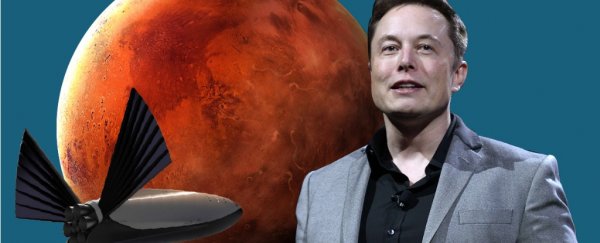Elon Musk, the billionaire founder of SpaceX, is about to present an updated plan for colonising Mars with 1 million people.
The International Astronautical Congress in Adelaide, Australia, is hosting Musk's presentation on Friday. SpaceX will stream video of the event via a YouTube Live feed, which we've embedded at the end of this post.
Coverage should begin Friday at 12:30 am EDT (2 pm ACST), when Musk is scheduled to go on stage.
Musk tweeted on Monday that he'll unveil "major improvements" and "unexpected applications" in the talk.
During his one-hour presentation at last year's IAC in Guadalajara, Mexico, Musk revealed his Mars vehicle design.
It features a two-part, 40-story-tall vehicle called the Interplanetary Transport System that would vastly outperform NASA's Saturn V moon rocket. Musk refers to the system's spaceship, which is expected to ferry 100-200 people to the red planet, as the "Heart of Gold" (named after the vessel in "The Hitchhiker's Guide to the Galaxy").
Musk commonly calls the system's largest part - a giant reusable booster - the "Big F-ing Rocket" (BFR for short). In a tweet on Tuesday, he said he will "describe [the] new BFR planetary coloniser design in detail" during the talk.
"This should be worth seeing," he said. "Design feels right".
A scientific journal published Musk's full Mars colonisation scheme in June, though it mostly covered the same points as his IAC 2016 talk.
After the plan was published, Musk noted on Twitter that an update (V2) was "coming soon", and that it'd address the "most fundamental flaw" of the first version: how to pay for the Mars vehicle's development and operation.
SpaceX's goal is to make it cheaper to ride to Mars than to buy a house, with a cost at or below US$100,000 per passenger. Making both the booster and spaceship fully reusable is key to vastly reducing the steep costs of launching people and cargo off of Earth.
Musk thinks the first colonists could survive and eventually return to Earth by finding a way to harvest carbon dioxide and water in Martian air and soil, then convert that material into breathing air, rocket fuel, and more.
Some spaceflight experts have expressed scepticism about the plan - namely a lack of details about living quarters, life support, food growth schemes, radiation shielding, and related systems.
However, few dispute that Musk's Mars transportation concept is feasible with adequate funding.
Since Musk's 2016 talk, SpaceX engineers have been actively building and testing core hardware to support the ambitious scheme.
For example, the company has shown off its powerful new Raptor rocket engine - the bottom of the giant Mars rocket booster (or BFR) would have 42 of those engines.
The company also unveiled a giant carbon-fibre fuel tank around which the Heart of Gold spaceship would be built and successfully pressure-tested the vessel.
Tune in to Musk's talk below shortly before 12:30 am EDT on Friday (9:30 pm PDT on Thursday).
This article was originally published by Business Insider.
More from Business Insider:
